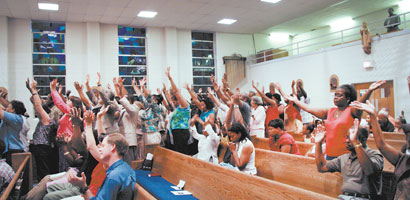 What is Black Catholic History Month?
What is Black Catholic History Month?
On July 24, 1990, the National Black Catholic Clergy Caucus of the United States designated November as Black Catholic History Month to celebrate the history and heritage of black Catholics. November is significant because two important black saints are commemorated within the month: St. Martin de Porres' feast day (Nov. 3) and St. Augustine's birthday (Nov. 13). With All Saints and All Souls' Day, we also remember the saints and souls of Africa and the African Diaspora.
African-American Catholics by the numbers
There are 3 million African-American Catholics in the United States.
Of Roman Catholic parishes in the United States, 798 are considered to be predominantly African-American. Most of those continue to be on the East Coast and in the South.
About 76 percent of African-American Catholics are in diverse or shared parishes, and 24 percent are in predominately African-American parishes.
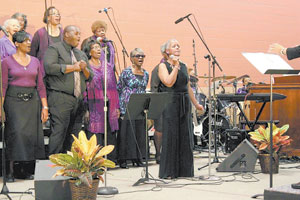 Check out the many educational resources online detailing the contributions of African-American Catholics in the U.S., at www.usccb.org/issues-and-action/cultural-diversity/african-american/resources.
Check out the many educational resources online detailing the contributions of African-American Catholics in the U.S., at www.usccb.org/issues-and-action/cultural-diversity/african-american/resources.
— USCCB
Pictured: Black Catholics across the diocese, including the vibrant parish of Our Lady of Consolation Church in Charlotte, are rooted in praise and spirituality. Our Lady of Consolation's award-winning choir, the Perpetual Hope Gospel Choir, is pictured above during a concert, along with a recent African-American Affairs Ministry sponsored tent revival at the parish. (Photos provided by Rosheene Adams)
What is the diocese's African- American Affairs Ministry?
On May 17, 1985, a group of 10 people calling themselves the Committee for Concerned Black Catholics met to discuss issues and concerns that were particular to black Catholics in the diocese. They urged then Bishop John Donoghue to coordinate efforts of black Catholics in the diocese.
In July 1985, the ministry was officially begun as the Diocesan Committee on Black Catholic Ministry and Evangelization, and was a part of the diocesan Ministry for Justice and Peace. In 1989 it became a separate office to address and serve the needs and concerns of black Catholics in the diocese.
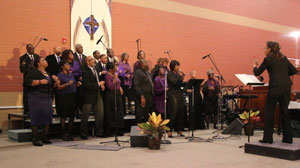 Since then, the African-American Affairs Ministry has grown. Its main goal is to make visible the work, contributions, traditions and culture of black Catholics to the Church and to society, and to propose adequate diocesan responses to racism and other social injustices.
Since then, the African-American Affairs Ministry has grown. Its main goal is to make visible the work, contributions, traditions and culture of black Catholics to the Church and to society, and to propose adequate diocesan responses to racism and other social injustices.
— www.charlottediocese.org
Predominantly black parishes in the diocese
The diocese has four parishes with an African-American Catholic heritage:
- Our Lady of Consolation Church, Charlotte (1955, combining the former St. Mary and Our Lady of Perpetual Help parishes)
- St. Mary Church, Greensboro (1928)
- St. Benedict the Moor Church, Winston-Salem (1940)
- St. Helen Mission, Spencer Mountain (early 1900s)
Related story: Black Catholic popes, saints and leaders
Biloxi's retired bishop has historic local ties
Bishop Emeritus Joseph L. Howze of Biloxi, Miss., was the first priest of the Diocese of Charlotte to become a bishop and the first black Catholic bishop in the 20th century to head a diocese. At the time of his retirement in 2001, he was the top-ranking active black Catholic bishop in the U.S.
A native of Daphne, Ala., he converted to Catholicism in 1948. He was ordained to the priesthood for the Diocese of Raleigh on May 7, 1959, and his first assignment was at Our Lady of Consolation Church in Charlotte.
When the Diocese of Charlotte was carved out of the Diocese of Raleigh in 1972, then Father Howze was serving as the pastor of the Parish (now Basilica) of St. Lawrence in Asheville. Soon after, he was consecrated auxiliary bishop of Natchez-Jackson, Miss., and in 1977 he became the first bishop of the Diocese of Biloxi. He retired in 2001.
The bishop recently shared some recollections of growing up in the segregated South and how racial healing was gradually brought about through the 1964 Civil Rights Act. "I think I was about 9 years old when the Depression came on," he said. "I remember that there was very strong segregation in Alabama, especially in Baldwin County. We went to public schools and the schools for the black kids were closed in March so they could work in the potato fields. The other schools were not closed. So that shows you the difference between the races during that particular time. Segregation was pronounced."
However, Bishop Howze said his family was fortunate in that they were never the targets of serious racial backlash. Nevertheless, Bishop Howze said that, as a young boy, he wondered about different aspects of racial segregation. "I wondered why, when we got on a public bus, we had to sit in the back with a curtain drawn in front of us and things like that," he told the Gulf Pine Catholic, newspaper of the Diocese of Biloxi. "But there was no racial violence directed toward me and my family when I was growing up."
— Catholic News Herald and Catholic News Service
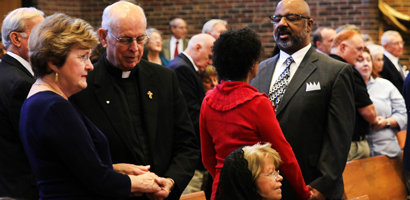 Jubilee anniversary Mass for couples offered by Bishop Jugis
Jubilee anniversary Mass for couples offered by Bishop Jugis
CHARLOTTE — “Christian married couples are signs of God’s love,” Bishop Peter Jugis told dozens of married couples during a special Mass offered in their honor Oct. 18. “You are God’s masterpiece.”
Couples from across the Diocese of Charlotte who are marking their silver or golden wedding anniversary this year renewed their marriage vows at the annual Mass, celebrated this year at St. John Neumann Church in Charlotte.
Bishop Jugis noted that this year the celebration of marriage and family life is receiving greater emphasis because of the ongoing Synod of Bishops in Rome and the recent conclusion of the World Meeting of Families in Philadelphia. Why? Because it is important to highlight the special mission of Christian married couples and families, he said.
In essence, he said, “the vocation of marriage and family is love.” Christian married couples are called to share the love of God with others, both in the Church and in the broader world, he said.
Quoting from Pope Francis, Bishop Jugis noted, “Christians do not marry only for themselves. The Christian marriage is different from those who marry only in the secular order; Christian marriage is not a private affair, he says. Christians marry in the Lord for the benefit of the whole community of the Church and also for the benefit of all of society. What he means by that is that Christian married couples are signs of God’s love.
“People in society may be following a purely secular mindset, marrying for various reasons … but Christian marriage is different: as a sign of God’s love, meant to bring life to the Church by their love and by the children that they bring into the world and raise in the faith.”
“Christian married couples are meant to share the love and peace that they experience in their marriage with everyone they meet.”
Christian families thus help build up the Church and society, he said.
“Christian married couples, our Holy Father likes to say, are missionaries of Christ’s love – enriching the community of the Church and enriching the broader secular society.
“You bring the presence of Christ to others.”
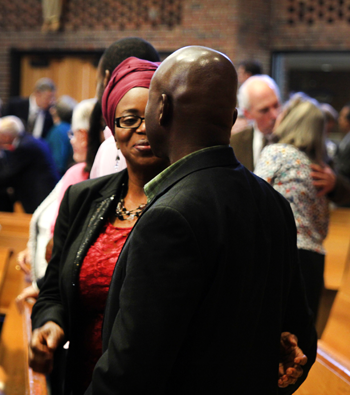 Rick and Sayenoh Mensah of Our Lady of Consolation Church in Charlotte are celebrating their silver wedding anniversary this year.Pope Francis also describes marriage between man and woman as “God’s masterpiece” – the supreme achievement of all His Creation, Bishop Jugis continued. God created the entire universe, lastly creating man and woman in His image to live together in love and unity. Jesus Christ affirmed and blessed the sanctity of marriage, elevating it to a sacrament, he added.
Rick and Sayenoh Mensah of Our Lady of Consolation Church in Charlotte are celebrating their silver wedding anniversary this year.Pope Francis also describes marriage between man and woman as “God’s masterpiece” – the supreme achievement of all His Creation, Bishop Jugis continued. God created the entire universe, lastly creating man and woman in His image to live together in love and unity. Jesus Christ affirmed and blessed the sanctity of marriage, elevating it to a sacrament, he added.
Bishop Jugis cautioned the couples not to let disunity or mistrust come between them.
“Beware of the devil. He is very jealous of you. He is jealous of the peace and the harmony and the mutual respect of Christian marriage and family,” he said. The Book of Genesis not only describes God’s creation of the world and of man and woman, he said, it also describes how the devil tempts the couple into falling away from God.
“He introduced mistrust and suspicion into their relationship, to destroy the beautiful masterpiece that God created,” he said. “And it has been like that from the beginning. The only remedy, as we all know, is Jesus and His saving grace.”
Among the couples celebrating their 25th anniversary were Rick and Sayenoh Mensah of Our Lady of Consolation Church in Charlotte. Their advice for a happy marriage? “Keep Christ at the center of your relationship,” Mrs. Mensah said.
Trusting each other is also key, said Vince and Alice Lombardo of Our Lady of the Annunciation Church in Albemarle, who celebrated their 50th wedding anniversary on Sept. 24. That, and never letting disagreements go on too long, they added.
“May the love of Christ continue to shine brightly on your marriage,” Bishop Jugis told the couples. “This is your vocation and this is your mission in the Church and in the world: sharing the love of Christ which you have come to experience in each other. May God’s blessing remain with you and with your families.”
— Patricia L. Guilfoyle, editor

